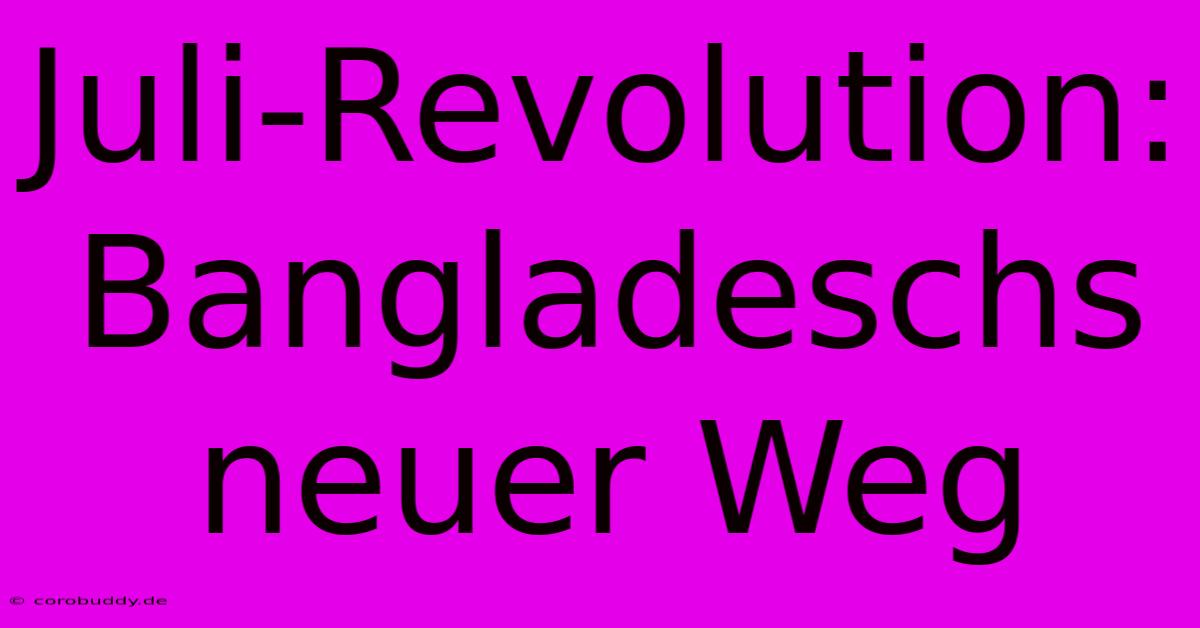Juli-Revolution: Bangladeschs Neuer Weg

Discover more detailed and exciting information on our website. Click the link below to start your adventure: Visit Best Website Juli-Revolution: Bangladeschs Neuer Weg. Don't miss out!
Table of Contents
Juli-Revolution: Bangladeschs neuer Weg – Ein Blick zurück und nach vorne
Hey Leute! Let's talk about the Juli-Revolution in Bangladesh – a pretty pivotal moment in their history, right? I've always been fascinated by history, especially those turning points that reshape a nation. And the 1975 events in Bangladesh, well, they definitely fit that bill. It's a complex story, filled with political intrigue, military coups, and sadly, a lot of bloodshed. It's not something you can easily sum up in a few sentences, but I'll try my best to give you the lowdown from my perspective, warts and all.
The Backdrop: A Nation in Flux
Before we dive into the chaos of July, we need a little context. Bangladesh, newly independent in 1971 after a brutal war with Pakistan, was still finding its feet. Think newborn baby – vulnerable, fragile, and desperately needing stability. Sheikh Mujibur Rahman, the "Father of the Nation," was in power, but the country faced huge challenges: poverty, political instability, and a fragile economy. It was a pressure cooker waiting to explode, you know? The seeds of discontent were already sown. There were different factions vying for power, dissatisfaction within the military, and whispers of corruption. It wasn't a pretty picture.
The Coup and its Aftermath: A Bloody July
Then, bam – July 1975. A military coup, swift and brutal. Sheikh Mujibur Rahman and much of his family were assassinated. It was a complete shock. The whole nation was thrown into utter turmoil. I remember reading about it in my history books – the sheer brutality of it all was shocking. The power vacuum was immediately filled, with different groups fighting for control. It was a period of intense instability. Think of it like a game of musical chairs, but instead of chairs, it's positions of power, and the prize is…well, the country's future. And the consequences were absolutely devastating for the people of Bangladesh. This was a tragic time that had a lasting impact on Bangladesh’s political scene. The very fabric of the nation was shaken.
The Long Shadow of the Revolution: Consequences and Legacy
The aftermath of the Juli-Revolution was far-reaching and complex. The subsequent years saw a series of military regimes, further political instability, and economic struggles. The assassination of Sheikh Mujibur Rahman left a gaping hole in the nation's leadership and created deep divisions within society. You can still feel the reverberations today. It's like trying to fix a broken vase – you can glue it back together, but the cracks will always be there.
Understanding the Juli-Revolution Today: Key Takeaways
Understanding the Juli-Revolution requires careful consideration of several factors. The political climate, economic conditions, and the role of the military are all crucial in interpreting this significant event. It's more than just a date in a history book. It's a study in political power, national identity, and the long-term consequences of violence. We need to learn from the past to shape a better future. It’s a reminder of the fragility of democracy and the importance of peaceful transitions of power. For me, understanding this period is essential to understanding modern Bangladesh.
So, there you have it – my take on the Juli-Revolution. It's a complex and tragic story, but understanding it is key to understanding Bangladesh today. I've tried to keep it relatively straightforward, but there's much more to explore. Let me know if you have any questions. Maybe we can discuss this further sometime!

Thank you for visiting our website wich cover about Juli-Revolution: Bangladeschs Neuer Weg. We hope the information provided has been useful to you. Feel free to contact us if you have any questions or need further assistance. See you next time and dont miss to bookmark.
Featured Posts
-
Anthropic Erhaelt 4 Milliarden Von Amazon
Nov 23, 2024
-
Darmstadt Siegt In Hannover
Nov 23, 2024
-
Kane Hattrick Bayern Siegt 3 0
Nov 23, 2024
-
Nasskalt In Osnabrueck Und Umgebung
Nov 23, 2024
-
Kendrick Lamars Neues Album Jetzt Da
Nov 23, 2024
